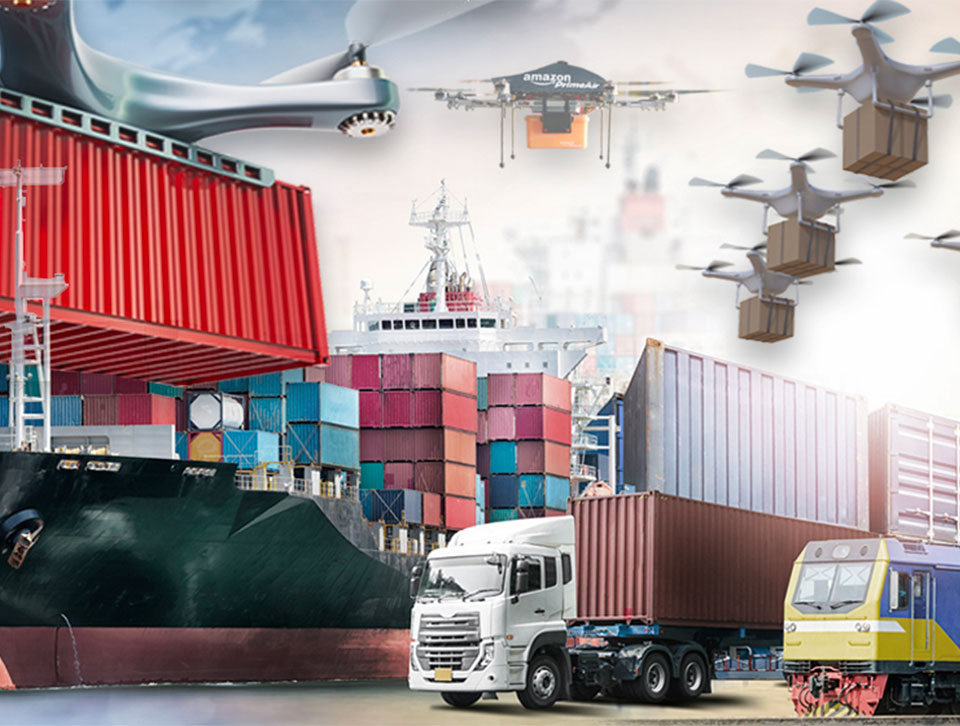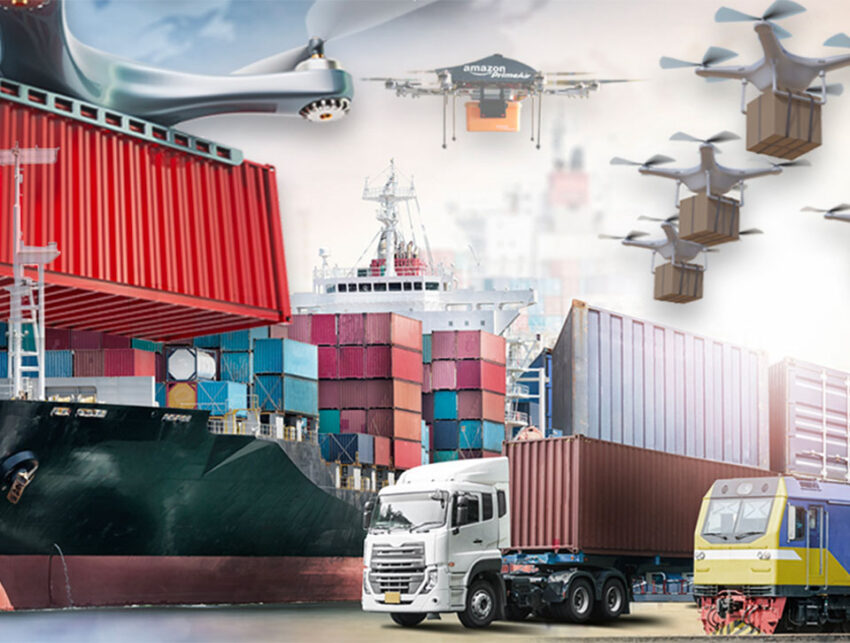Drones or UAVs are the latest addition in the logistics sector that is expected to generate tremendous economic growth in the coming years. Companies like Matternet and Amazon have made it clear that drones will become the future of freight technology. Moreover, the pandemic has increased the demand for contactless deliveries. This is yet another factor that is giving a great boost to the drone delivery sector. With over 500,000 drones registered for industrial use, the drones are all set to transform the future of the transportation and logistics industry.

The use of drones in the transportation and logistics industry
Drones are currently being used in logistics for quick deliveries of small packages and parcels. The e-commerce boom has paved the way for the use of drones in logistics. E-commerce giants like Amazon are providing their customers with same-day delivery services. Other companies are trying their best to provide similar services. Therefore, the biggest commercial application of drones are in the field of last-mile delivery. Moreover, drones require considerably less manpower that helps to reduce the long term expenses of the companies. We even have heavy-duty drones that are capable of moving inventory between warehouses.
Transport drones can will soon play a major role in the ocean freight sector. They can help to simplify the inspection and review process in the sea freight shipping industry. Drones can even help monitoring the loading and unloading of cargoes and add value to several port operations. This is a very important factor that will highlight the role of drones in the transportation and logistics industry.
The major players in the drone delivery sector
Apart from Amazon, the uncontested leader in drone deliveries, some of the top logistics companies like UPS, DHL, and FedEx are also coming up with drone programmes focusing on last-mile logistics. Walmart has partnered with drone companies like Zipline and Flytrex and conducting pilot programmes for drone deliveries. The Flytrex drones can carry cargoes weighing up to 6.6 lbs and do 5 mile round trips. To quote the CEO of Flytrex, “Online ordering has seen an amazing boom in the last year-and-a-half because of COVID-19. With that, you’re seeing interesting and better on-demand delivery services, because the current options are just not good enough.” Their long-term goal is to make drone deliveries much cheaper than deliveries by a human agent.
Matternet – another big name in the drone manufacturing sector, is focusing on the health care industry. They have partnered with UPS to provide medical delivery services for hospitals in Germany and the USA. They are not only expanding their operations in Japan and Switzerland but also ready to capture the market in India. Another drone delivery company Zipline is breaking new grounds by delivering live saving medicines to the remote regions of Rwanda in East Africa.
Boeing along with Drone Delivery Canada are now looking to transport heavier cargo via drones. Drone Delivery Canada is experimenting with heavy lift, long-range cargo delivery drones. Their heavy-duty drone called The Condor can transport cargoes of up to 180 kg to a distance of 200 Km. In the words of their CEO, Michael Zahra, “Market response to the Condor has been overwhelmingly strong. The capabilities of the Condor simply address many social (medical, pharmaceutical, remote communities, humanitarian aid, etc) and economic (mining, oil & gas, courier, etc) use-cases being requested by DDC’s customers.”
The impact of drones on the freight forwarding industry
-
Fastest deliveries
Gone will be the days when a parcel will be picked in the warehouse, loaded onto a truck, and then reach the customers via traditional channels. In the future, drones will pick up an order at the click of the mouse and start flying toward the customers’ doorstep. It will help to ease up the problem of traffic congestion, unavailability of delivery personnel, or any other logistical challenges. Amazon Prime Air is all set to deliver parcels up to 5 lbs to their customers within less than 30 minutes. The latest drone designs ensure stability, efficiency, and safety. Amazon’s drone delivery programme will surely up the ante for the competing e-commerce companies. Simply put, faster delivery of shipments will also take the customer expectations a notch higher.
-
Less shipping costs
One of the major impacts of drones on the logistics industry will be the drastic reduction in shipping expenses. According to a report by Business Insider, each Amazon drone delivery will cost as less a $1.00. As per a report by Gartner, drone deliveries will help to lower the last mile logistics cost by around 70%. Companies will now spend much less on trucking, or fuel. Undoubtedly the use of drones is going to be a game-changer in the freight forwarding industry.
-
Drastic change in the warehouses and distribution centres
Drone delivery will irrevocably alter the design and functioning of warehouses and distribution centres. At the moment, warehouses come with huge docks that determine how fast the shipments will be entered into inventory and shipped out to the clients. Well-managed dock management ensures the right coordination of incoming and outgoing parcels. This helps to avoid long wait times. Once drone deliveries become the norm, warehouses will no longer require large docks for accommodating fleets of trailers.
In other words, it will completely change the normal functioning of distribution centres and warehouses. Airbourne fulfillment centres (AFCs) are going to be the future. In the near future, UAV’s will take up full responsibility of product deliveries in these floating warehouses. To quote from Amazon’s patent application for airbourne fulfillment centres, “The AFC may be an airship that remains at a high altitude and UAVs with ordered items may be deployed from the AFC to deliver ordered items to user designated delivery locations…As the UAVs descend, they can navigate horizontally toward a user-specified delivery location using little to no power, other than to stabilize the UAV and/or guide the direction of descent.”
-
Reverse logistics will become easier
Drones will not only speed up the delivery process but also do the same for the return process. Reverse logistics have become extremely important in the age of e-commerce. Customers who are not happy with a product want to return it ASAP to get a refund and place a new order. The use of drones will make the return process less of a hassle. It will result in faster turnarounds and take e-commerce operations to a whole new level.
Drone deliveries are indeed a great step forward in the transportation and logistics industry. However, even though there have been quite a few succesful drone deliveries in the past few months, it still has a long way to go. We expect more collaboration between drone companies and logistics service providers in the coming years. The objective should be to introduce a quicker, safer, cheaper, and more convenient delivery process not just in the metropolis but also in the rural areas.


